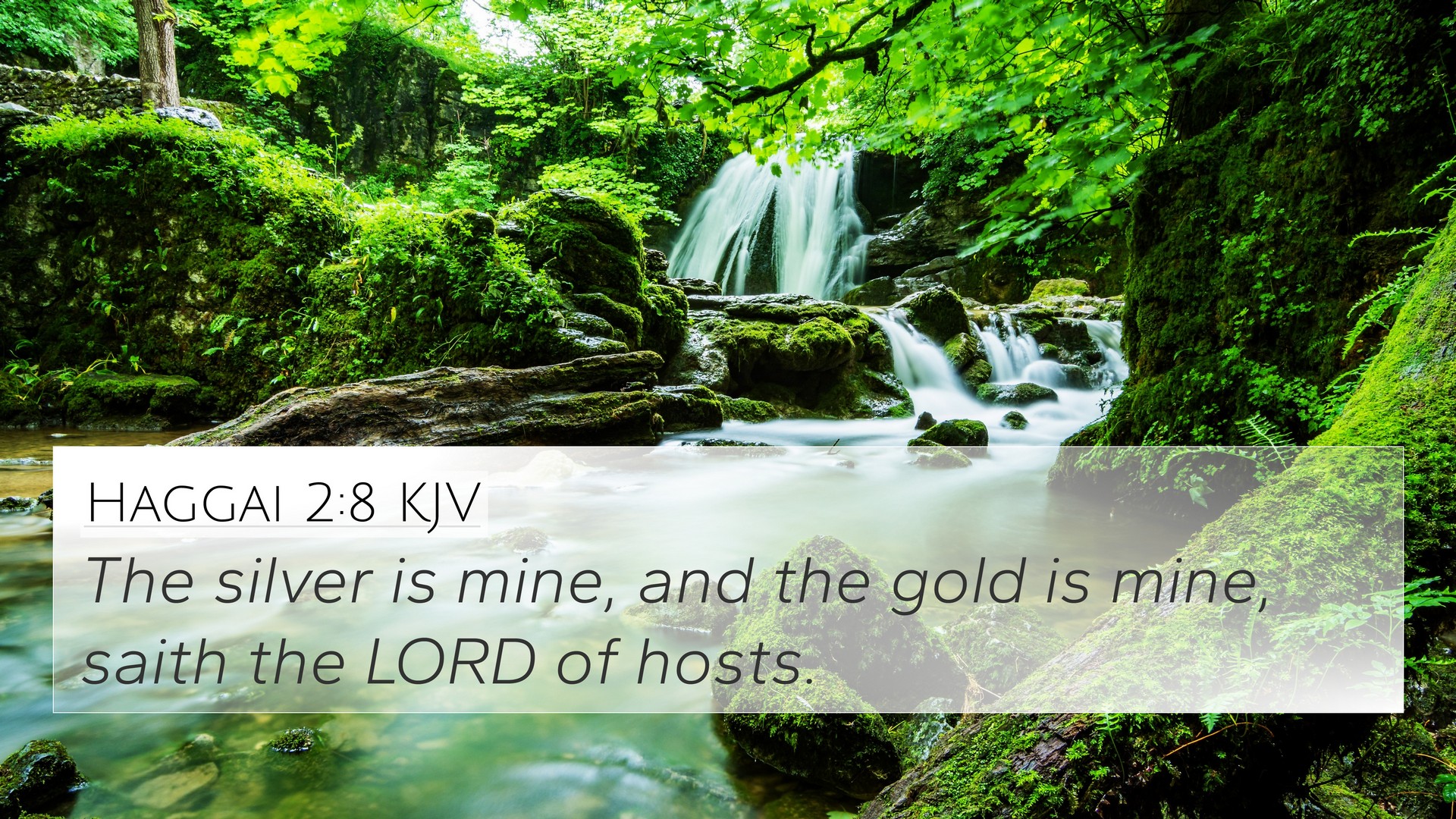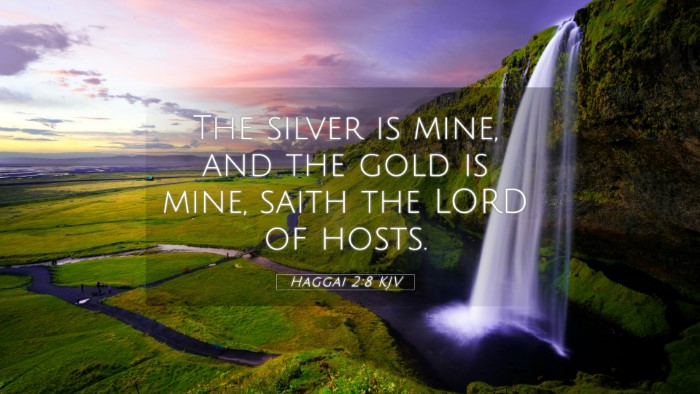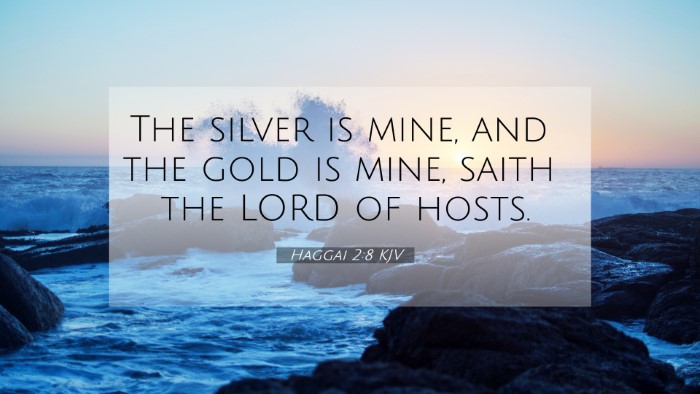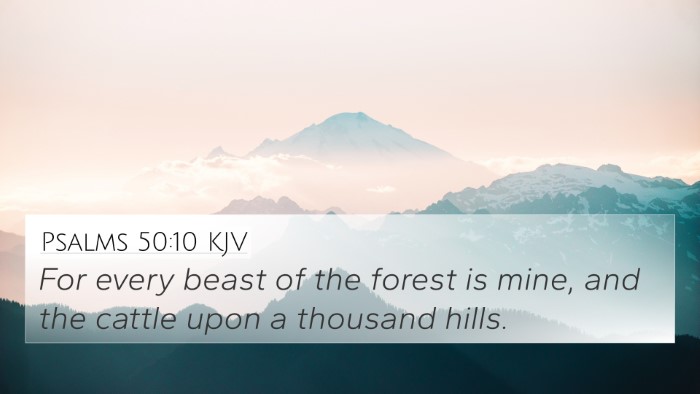Old Testament
Genesis Exodus Leviticus Numbers Deuteronomy Joshua Judges Ruth 1 Samuel 2 Samuel 1 Kings 2 Kings 1 Chronicles 2 Chronicles Ezra Nehemiah Esther Job Psalms Proverbs Ecclesiastes Song of Solomon Isaiah Jeremiah Lamentations Ezekiel Daniel Hosea Joel Amos Obadiah Jonah Micah Nahum Habakkuk Zephaniah Haggai Zechariah MalachiHaggai 2:8 Similar Verses
Haggai 2:8 Cross References
The silver is mine, and the gold is mine, saith the LORD of hosts.
Uncover the Rich Themes and Topics of This Bible Verse
Listed below are the Bible themes associated with Haggai 2:8. We invite you to explore each theme to gain deeper insights into the Scriptures.
Haggai 2:8 Cross Reference Verses
This section features a detailed cross-reference designed to enrich your understanding of the Scriptures. Below, you will find carefully selected verses that echo the themes and teachings related to Haggai 2:8 KJV. Click on any image to explore detailed analyses of related Bible verses and uncover deeper theological insights.
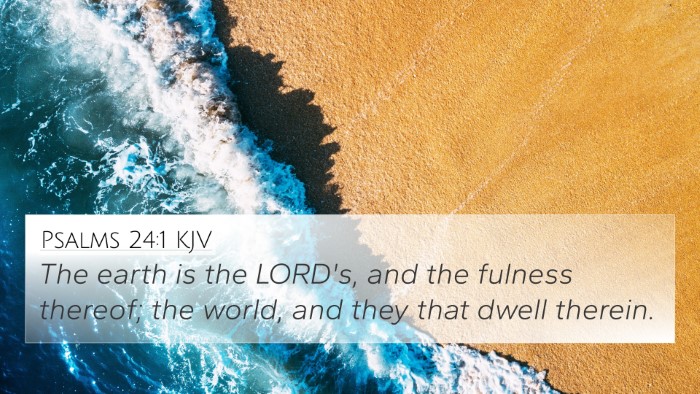
Psalms 24:1 (KJV) »
The earth is the LORD's, and the fulness thereof; the world, and they that dwell therein.
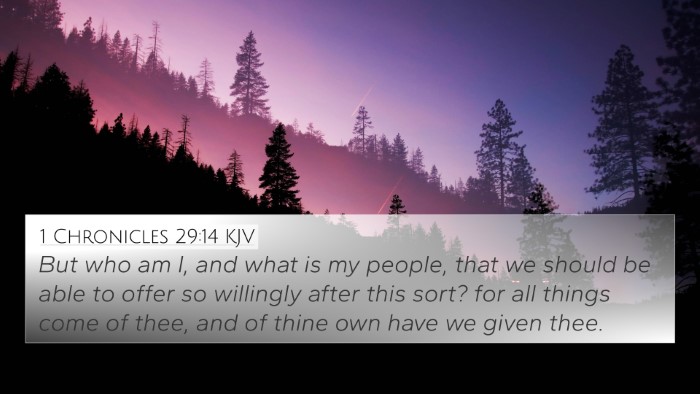
1 Chronicles 29:14 (KJV) »
But who am I, and what is my people, that we should be able to offer so willingly after this sort? for all things come of thee, and of thine own have we given thee.
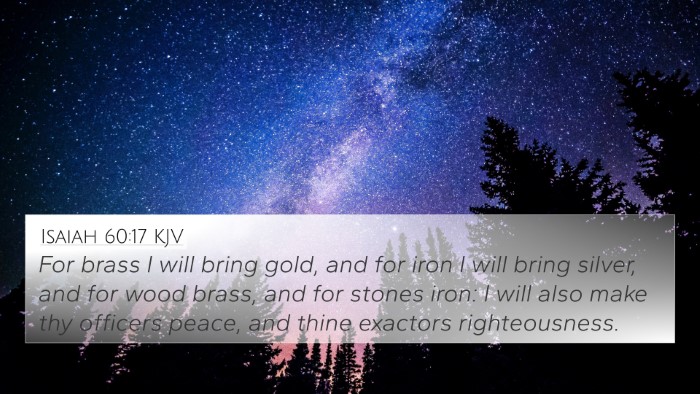
Isaiah 60:17 (KJV) »
For brass I will bring gold, and for iron I will bring silver, and for wood brass, and for stones iron: I will also make thy officers peace, and thine exactors righteousness.
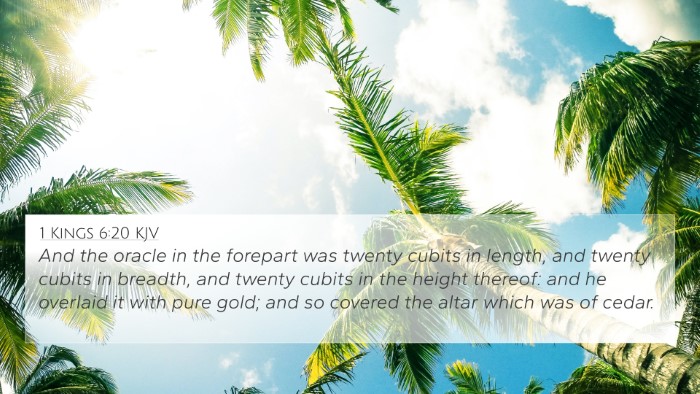
1 Kings 6:20 (KJV) »
And the oracle in the forepart was twenty cubits in length, and twenty cubits in breadth, and twenty cubits in the height thereof: and he overlaid it with pure gold; and so covered the altar which was of cedar.
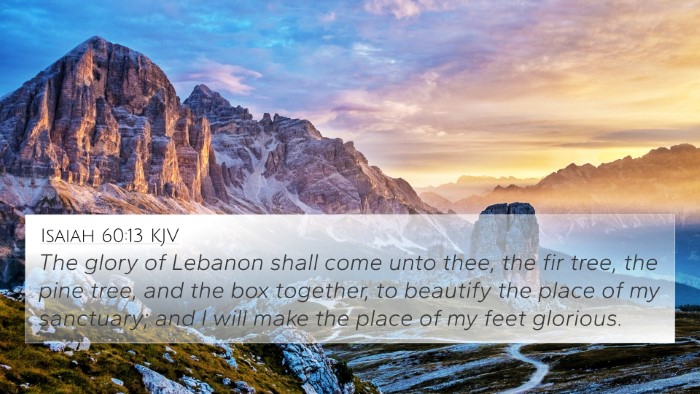
Isaiah 60:13 (KJV) »
The glory of Lebanon shall come unto thee, the fir tree, the pine tree, and the box together, to beautify the place of my sanctuary; and I will make the place of my feet glorious.
Haggai 2:8 Verse Analysis and Similar Verses
Understanding Haggai 2:8
Bible Verse: Haggai 2:8 - "The silver is mine, and the gold is mine, saith the LORD of hosts."
Summary of Meaning
This pivotal verse from Haggai emphasizes God's sovereignty over all materials and resources, specifically silver and gold. It serves as a reminder to the Israelites of God's ownership of the earth and its riches, thus reassuring them of His ability to provide for their needs.
Commentary Insights
Matthew Henry's Commentary
Matthew Henry emphasizes the absolute ownership of God over all things, noting that His wealth is not dependent on human possession. He explains that this verse underlines God's authority and reminds the faithful that all riches belong to Him, thus encouraging reliance on God's provision rather than earthly wealth.
Albert Barnes' Notes
Albert Barnes points out that the declaration of ownership of silver and gold reflects God's providential care over His people. He interprets this as a call for the Israelites to focus on spiritual wealth rather than material gain. This should inspire faith in the divinely appointed task of rebuilding the temple, indicating that their labor is not in vain as God is the ultimate source of all resources.
Adam Clarke's Commentary
Adam Clarke discusses the Israelites' context, indicating how this reminder of God's dominion serves to uplift their spirits amidst discouragement. He asserts that the ownership of riches aligns with God's plan for His people, and that they have nothing to fear regarding their material needs during the reconstruction efforts.
Key Themes
- Divine Sovereignty: God's ultimate control over the wealth and resources of the world.
- Faith and Provision: Encouragement to trust in God's provision during struggles.
- Spiritual versus Material Wealth: The emphasis on prioritizing spiritual efforts over material concerns.
Cross-References for Haggai 2:8
- Psalm 24:1: "The earth is the Lord’s, and the fullness thereof."
- 1 Chronicles 29:11-12: Acknowledging that all things come from God.
- Matthew 6:19-21: Not storing treasures on earth but in heaven.
- Philippians 4:19: God will supply all needs according to His riches.
- Hebrews 13:5: Contentment with what you have because God is with us.
- Job 31:24-25: Job’s reflections on wealth and trust in God.
- 1 Timothy 6:17: Trust not in uncertain riches, but in God.
- Luke 12:15: A man’s life does not consist in the abundance of his possessions.
- Proverbs 10:22: "The blessing of the Lord, it maketh rich."
- Deuteronomy 8:18: Remembering the Lord who gives power to obtain wealth.
Bible Verse Connections
Haggai 2:8 connects to several other scriptures, illustrating the theme of God's ownership and provision:
- Thematic connections with God's provision highlight a consistent biblical narrative that emphasizes faith in God's ability to support and provide.
- Comparing this verse with Matthew 6:19-21 establishes a contrast between earthly wealth and heavenly treasures, reinforcing the spiritual focus.
- In Philippians 4:19, there is a direct assurance of need met, paralleling Haggai's message that God's resources are plentiful.
Conclusion
The verse Haggai 2:8 serves as a vital reminder of God's sovereignty over material wealth and encourages reliance on His provision. By examining it through the lens of various commentaries, the themes of faith, divine ownership, and encouragement to focus on spiritual riches are poignantly illustrated. Cross-referencing with related scriptures enriches our understanding of this powerful declaration.
Exploring Further
For those interested in deeper study, consider using tools for Bible cross-referencing such as a Bible concordance or a cross-reference guide to explore how these themes interconnect throughout both the Old and New Testaments. Engaging in a cross-reference Bible study can reveal profound insights and harmonious themes that connect diverse biblical texts.
Suggested Study Methods
- How to find cross-references in the Bible: Utilize a study Bible with annotated references or digital Bible study tools.
- Identifying connections between Old and New Testament: Look for allusions and themes that transcend Testaments.
- Detailed cross-reference between Gospels: Analyze parallel passages in the Synoptic Gospels.
- Bible verses related to economic themes: Study various verses that discuss stewardship and wealth management.
- Cross-referenced themes in the Bible: Examine themes of God's provision across different books of the Bible.
